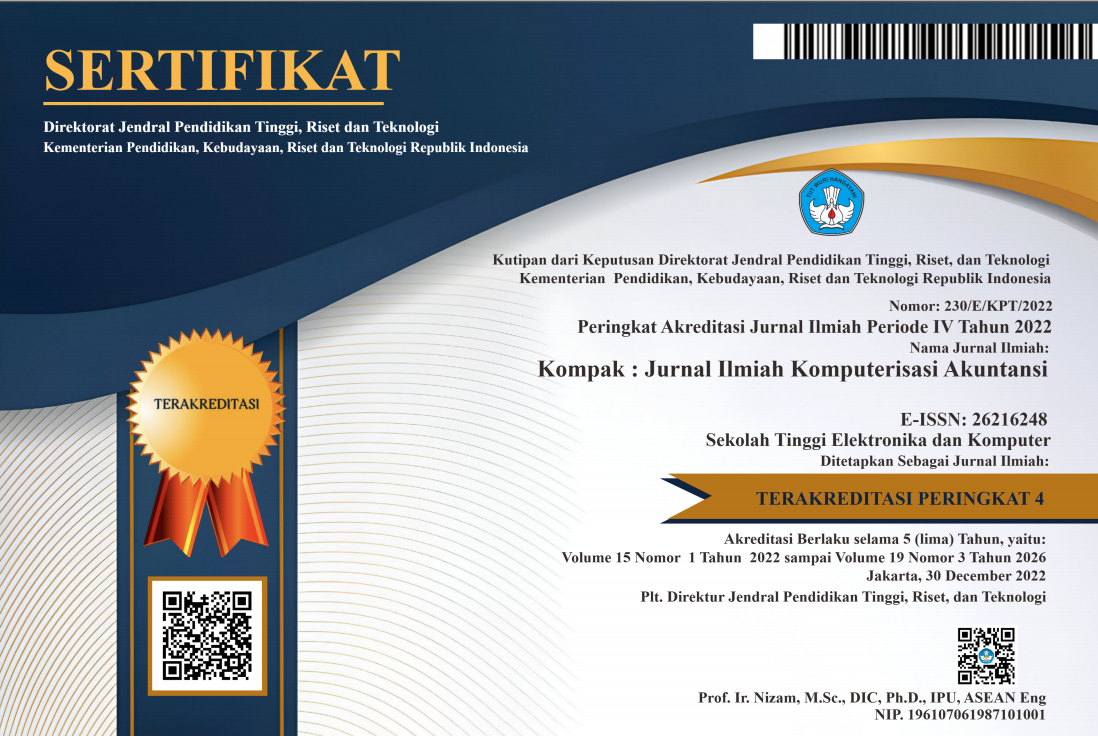Examining the impact of servant leadership on turnover intention via organizational affective commitment as mediation: Empirical study
DOI:
https://doi.org/10.51903/kompak.v16i2.1625Keywords:
Servant leadership, turnover intention, organizational affective commitmentAbstract
This study's objective is to examine the influence of servant leadership on turnover intention and the impact of organizational affective commitment as a mediator between these two relationship constructs. This investigation employs a quantitative methodology by surveying restaurant employees in Surabaya using questionnaires. Utilizing Structural Equation Modeling Partial Least Square (SEM PLS), the collected survey data were analyzed. 78 restaurant employees participated in this investigation as respondents. According to the findings of this study, servant leadership and affective organizational commitment have a significant negative effect on turnover intention. In addition, affective organizational commitment can substantially and negatively moderate the relationship between servant leadership and turnover intention. In this research, both theoretical and practical implications are discussed.
References
2. Junida AI. Kemenperin: Industri makanan dan minuman jadi bantalan saat krisis. https://www.antaranews.com/. 2022;
3. Jang J, Kandampully J. Reducing Employee Turnover Intention Through Servant Leadership in the Restaurant Context: A Mediation Study of Affective Organizational Commitment. Int J Hosp Tour Adm [Internet]. 2018;19(2):125–41. Available from: https://doi.org/10.1080/15256480.2017.1305310
4. Hakro TH, Jhatial AA, Chandio JA. Employee turnover intentions: Investigating the role of work overload, job satisfaction, employee engagement and job stress. Res J Soc Sci Econ Rev. 2022;2(2):71–82.
5. Rahman SM. Relationship between job satisfaction and turnover intention: Evidence from Bangladesh. Asian Bus Rev. 2020;10(2):99–108.
6. Kim CY, Lee JH, Shin SY. Why are your employees leaving the organization? The interaction effect of role overload, perceived organizational support, and equity sensitivity. Sustain. 2019;11(3).
7. Haynie JJ, Varma V, Ragland E. Daily supervisor support, engagement and prosocial behavior: how turnover intentions reduce the resources to pay it forward. J Manag Psychol. 2022;
8. Jung H, Jung SY, Lee MH, Kim MS. Assessing the presence of post-traumatic stress and turnover intention among nurses post–Middle East respiratory syndrome outbreak: the importance of supervisor support. Workplace Health Saf. 2020;68(7):337–45.
9. Ibrahim H, Nur S, Suan CL, Karatepe OM. The effects of supervisor support and self-efficacy on call center employees’ work engagement and quitting intentions. Int J Manpow. 2019;40(4):688–703.
10. Pahlevan Sharif S, She L, Liu L, Naghavi N, Lola GK, Sharif Nia H, et al. Retaining nurses via organizational support and pay during COVID‐19 pandemic: The moderating effect between intrinsic and extrinsic incentives. Nurs Open. 2023;10(1):123–34.
11. Fila MJ, Semmer NK, Kern M. When Being Intrinsically Motivated Makes You Vulnerable: Illegitimate Tasks and their Associations with Strain, Work Satisfaction, and Turnover Intention. Occup Heal Sci. 2023;1–29.
12. Al-Mahdy YFH, Alazmi AA. Principal support and teacher turnover intention in Kuwait: Implications for policymakers. Leadersh Policy Sch. 2023;22(1):44–59.
13. Westbrook KW, Peterson RM. Servant Leadership Effects on Salesperson Self-Efficacy, Performance, Job Satisfaction, and Turnover Intentions. J Business-to-bus Mark [Internet]. 2022;29(2):153–75. Available from: https://doi.org/10.1080/1051712X.2022.2068820
14. Aboramadan M, Hamid Z, Kundi YM, El Hamalawi E. The effect of servant leadership on employees’ extra-role behaviors in NPOs: The role of work engagement. Nonprofit Manag Leadersh. 2022;33(1):109–29.
15. Dahleez KA, Aboramadan M, Bansal A. Servant leadership and affective commitment: the role of psychological ownership and person–organization fit. Int J Organ Anal. 2021;29(2):493–511.
16. Hair JF, Hult GTM, Ringle C, Sarstedt M. A Primer on Partial Least Squares Structural Equation Modeling (PLS-SEM). California USA: SAGE Publication,Inc; 2014.
17. Abdillah W, Hartono J. Partial Least Square (PLS) Alternatif Structural Equation Modeling (SEM) dalam Penelitian Bisnis. Yogyakarta: ANDI; 2016. 103–150 p.
18. Ghozali I, Fuad. Structural Equation Modeling. Semarang: Universitas Diponegoro; 2008.
19. Mustamil N, Najam U. The impact of servant leadership on follower turnover intentions: Mediating role of resilience. Asian J Bus Account. 2020;13(2):125–46.
20. Achen RM, Dodd R, Lumpkin A, Plunkett K. Servant as leader: The effects of servant-leaders on trust, job satisfaction, and turnover intentions in intercollegiate athletics. Servant Leadersh Theory Pract. 2019;6(1):2.
21. Omanwar SP, Agrawal RK. Servant leadership, organizational identification and turnover intention: an empirical study in hospitals. Int J Organ Anal. 2022;30(2):239–58.
22. Guzeller CO, Celiker N. Examining the relationship between organizational commitment and turnover intention via a meta-analysis. Int J Cult Tour Hosp Res. 2020;14(1):102–20.
23. Ampofo ET, Karatepe OM. The effects of on-the-job embeddedness and its sub-dimensions on small-sized hotel employees’ organizational commitment, work engagement and turnover intentions. Int J Contemp Hosp Manag. 2022;34(2):509–33.
24. Bilal A, Siddiquei A, Asadullah MA, Awan HM, Asmi F. Servant leadership: a new perspective to explore project leadership and team effectiveness. Int J Organ Anal. 2020;29(3):699–715.
25. Clarence M, Devassy VP, Jena LK, George TS. The effect of servant leadership on ad hoc schoolteachers’ affective commitment and psychological well-being: The mediating role of psychological capital. Int Rev Educ [Internet]. 2021;67(3):305–31. Available from: https://doi.org/10.1007/s11159-020-09856-9
26. Wong Y-W, Wong Y. The effects of perceived organisational support and affective commitment on turnover intention: a test of two competing models. J Chinese Hum Resour Manag. 2017;8(1):2–21.
27. To WM, Billy TW. Impact of difficult coworkers on employees’ turnover intention: the mediating roles of perceived organizational support and affective commitment. Asia-Pacific J Bus Adm. 2023;(ahead-of-print).















.png)



